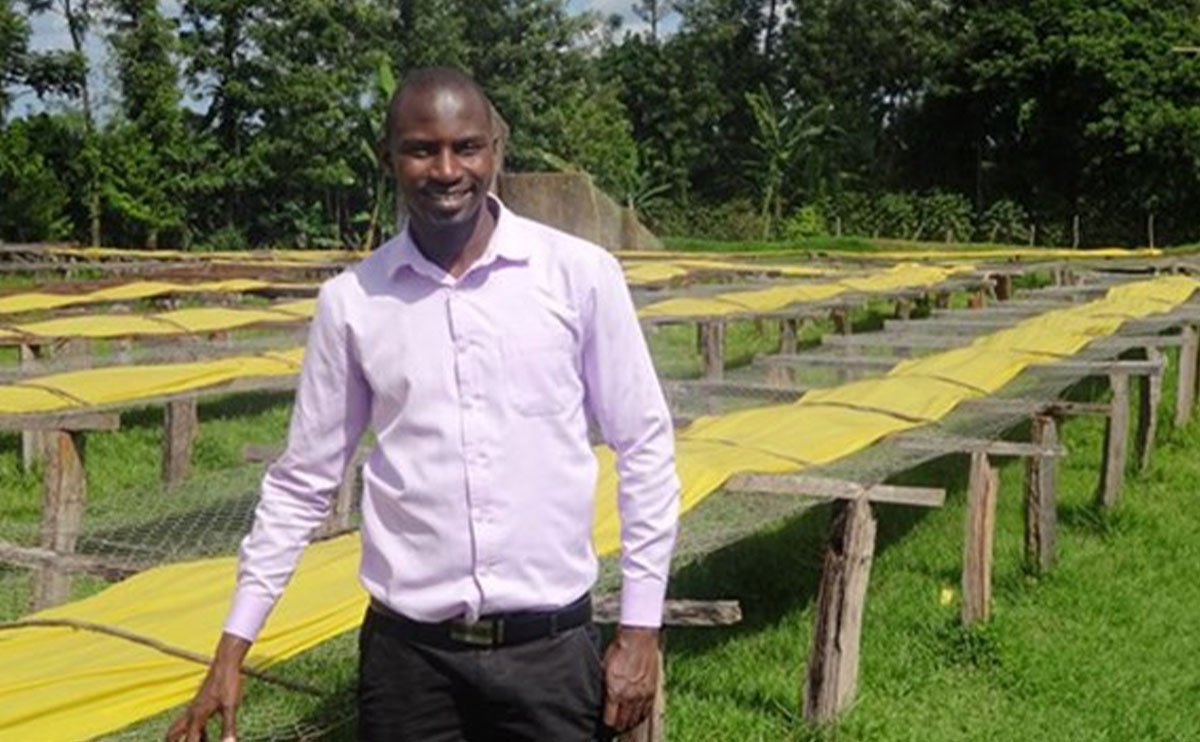Eric Munene: Because of soil testing, our farmers are increasing coffee production
Meru Central Coffee Cooperative Union (MCCCU) comprises 34 cooperatives in the region east of Mount Kenya. The cooperatives facilitate the sorting, milling and drying of the coffee beans. In total 98,000 farmers deliver coffee to MCCCU. The Union aims to make coffee production more rewarding for their farmers. One way to do so is to increase the productivity per coffee tree. This can be achieved by applying the right nutrients to the soil. Therefore, MCCCU decided to provide soil testing with the AgroCares Scanner to their members.
Successful introduction of five AgroCares Scanners
The man responsible for executing this plan was Eric Munene, head of the extension team. After repeatedly explaining the need for soil testing on members’ meetings and demonstrating the effect at demo farms, he is now able to look back on a successful introduction of five AgroCares Scanners.
Increased production with reduced costs
Eric Munene: “Initially we used to advise farmers to apply fertilizers as stated by coffee research institute. This helped farmers maintain a particular level of production. However, since we started offering soil analysis to our farmers, we have seen farmers apply fertilizers according to which nutrients their soils and crops need. This helped us buy the right fertilizers for the farmers. As a result, farmers have increased their production per unit piece of land and reduced their fertilizer usage, hence reducing the cost of production.”
2000 soil tests performed in the first year
In 2018, MCCCU used five soil Scanners. Each Scanner was assigned to an operator, who serves a region with several primary cooperatives. With promotor farmers collecting the soil samples, nearly 2000 soil tests were performed in the first year, mostly for different farms. Still, this number can increase substantially, as 200 soil tests were done even in a single week. With these numbers, a reasonable price per soil test can cover the costs of the Scanner and the annual licence to use the mobile app associated with the Scanner. Therefore, the MCCCU extension team expects to make a net profit on soil testing in the next year and use this money to improve the services they offer to their farmers.
From 150 tons of coffee beans in 2017 to 410 tons in 2018
A good example of the first year is the Kathere primary cooperative. By requiring all their farmers to do a soil test, the vast majority adapted their fertilizer inputs. As a result, the production of this cooperative increased from 150 tons of coffee beans in 2017 to 410 tons in 2018. Similar production increases have been observed by farmers at other primary cooperatives, though the vast number of farmers at most cooperatives is still to be served.
Significant production increase at a demonstration farm
A significant increase in the coffee production was also observed at a demo farm. Eric Munene: “In one of our demonstration farms which has 4,000 stems we used to apply 20 bags of 50kg of fertilizers and get an average harvest of 16,000 kilograms. Since we started testing the soil and following the fertilizer recommendations, the fertilizer usage has reduced to 15 bags and production has risen to 32,000 kilograms. Soil testing results helped us to apply the right fertilizers which was less than what we used to apply and increased our yields. This motivated our farmers to do soil tests on their soils and share a similar story to that of our demo farm. This has made the exercise popular among our farmers and helped us do over 1600 samples last year.”
Winning the Impact Maker Award
For this great achievement of increasing the productivity of coffee farms by providing farmers with soil analysis, Meru Central Coffee Cooperative Union was awarded the Impact Maker prize by AgroCares during a Community of Practice meeting in Nakuru early this year. Christy van Beek, Chief Agronomist at AgroCares: “We are glad to honor Meru Central Coffee Cooperative Union with this award. The Union is one of our best performing clients, not only in terms of the number of scans they made, but most importantly in terms of the impact they achieve.

